|
De Amerikaanse schrijver Tennessee Williams (eigenlijk Thomas Lanier Williams) werd geboren in Columbus, Mississippi, op 26 maart 1911. Zie ook alle tags voor Tennessee Williams op dit blog.
We have not long to love
We have not long to love.
Light does not stay.
The tender things are those
we fold away.
Coarse fabrics are the ones
for common wear.
In silence I have watched you
comb your hair.
Intimate the silence,
dim and warm.
I could but did not, reach
to touch your arm.
I could, but do not, break
that which is still.
(Almost the faintest whisper
would be shrill.)
So moments pass as though
they wished to stay.
We have not long to love.
A night. A day....
The Soft City
I
Eastward the city with scarcely even a murmur
turns in the soft dusk,
the lights of it blur,
the delicate spires are unequal
as though the emollient dusk had begun to dissolve them...
And the soft air-breathers,
their soft bosoms rising and falling as ferns under water
responding to some impalpably soft pressure,
turn with the city, too.
The petals of tenderness in them,
their tentative ways of feeling, not quite reaching out
but ever so gently half reaching out and withdrawing,
withdrawing to where their feminine star is withdrawing,
the planet that turns with them,
faithfully always and softly...
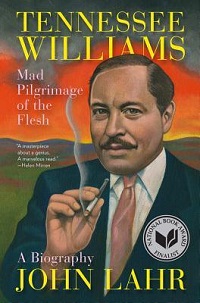
Tennessee Williams (26 maart 1911 – 25 februari 1983)
Cover
De Amerikaanse dichter Gregory Corso werd geboren in New York op 26 maart 1930. Zie ook alle tags voor Gregory Corso op dit blog.
America Politica Historia, In Spontaneity (Fragment)
I could never understand Uncle Sam
his red & white striped pants his funny whiskers his starry hat:
how surreal Yankee Doodle Dandy, goof!
American history has a way of making you feel
George Washington is still around, that is
when I think of Washington I do not think of Death—
Of all Presidents I have been under
Hoover is the most unreal
and FDR is the most President-looking
and Truman the most Jewish-looking
and Eisenhower the miscast of Time into Space—
Hoover is another America, Mr. 1930
and what must he be thinking now?
FDR was my youth, and how strange to still see
his wife around.
Truman is still in Presidential time.
I saw Eisenhower helicopter over Athens
and he looked at the Acropolis like only Zeus could.
OF THE PEOPLE is fortunate and select.
FOR THE PEOPLE has never happened in America or elsewhere.
BY THE PEOPLE is the sadness of America.
I am not politic.
I am not patriotic.
I am nationalistic!
I boast well the beauty of America to all the people in Europe.
In me they do not see their vision of America.
O whenever I pass an American Embassy I don’t know what to feel!
Sometimes I want to rush in and scream: “I’m American!”
but instead go a few paces down to the American Bar
get drunk and cry: “I’m no American!”
The men of politics I love are but youth’s fantasy:
The fine profile of Washington on coins stamps & tobacco wraps
The handsomeness and death-in-the-snow of Hamilton.
The eyeglasses shoe-buckles kites & keys of Ben Franklin.
The sweet melancholy of Lincoln.
The way I see Christ, as something romantic & unreal, is the way I see them.
An American is unique among peoples.
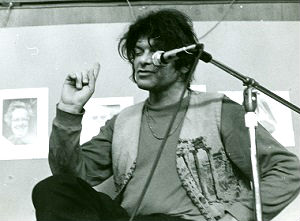
Gregory Corso (26 maart 1930 – 17 januari 2001)
De Zuid-Koreaanse dichter en schrijver Hwang Sun-won werd geboren op 26 maart 1915 in Taedong, Zuid-Pyongan, in het hedendaagse Noord-Korea. Zie ook alle tags voor Hwang Sun-won op dit blog.
Uit: Cranes (Vertaald door David R. McCann)
“The old grandfather with the wen had probably passed away in the time since. He hadn’t been among the old people encountered in the area so far.
Holding on to the chestnut tree, for a moment Sŏngsam looked up at the blue autumn sky. Even without the branch being shaken, one of the remaining chestnuts opened, and the nut slipped out,
and fell.
As he reached the front of a house, the temporary headquarters for the Public Peace Corps, he saw there was some young fellow tied up in handcuff rope.
It didn’t seem to be anyone he had seen before in the village, so he went up close for a look at his face. He was stunned. Wasn’t it his closest childhood friend, Tŏkchae?
What was going on, he asked the Public Peace Corpsman who had come over from Ch’ŏnt’ae with him.
Vice chairman of the Farmers Collective Committee, this one was, caught hiding out in his own house.
Sŏngsam squatted down there on the dirt floor, a lighted cigarette in his mouth.
Tŏkchae was going to be sent off to Ch’ŏngdan. One of the Public Peace Corps members was going to take him.
Lighting a new cigarette from the one he had just finished, Sŏngsam stood up again.
“I’ll take this sunnavabitch.”
Tŏkchae all this time kept his face turned away and did not even try to look in Sŏngsam’s direction.
The two came out of the village.
Sŏngsam smoked one cigarette after another. The cigarettes seemed to have no flavor. He just kept drawing the smoke in deep, and letting it out. After a while, the thought came to him that this
Tŏkchae fellow, he might want a cigarette too. He remembered when they were young, how they would make cigarettes out of pumpkin leaves and smoke them behind the wall, so the grown-ups wouldn’t know. But how could he offer a cigarette to a guy like this one, today?"
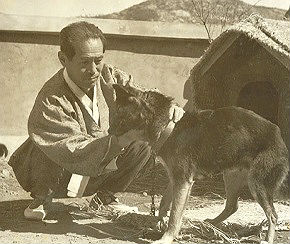
Hwang Sun-won (26 maart 1915-14 september 2000)
De Engels-Ierse schrijver en regisseur Martin McDonagh werd geboren op 26 maart 1970 in Camberwell, Londen. Zie ook alle tags voor Martin McDonagh op dit blog.
Uit: The Lieutenant of Inishmore
“DONNY If you admit it was you knocked poor Thomas down, Davey, I won’t tell him. If you carry on that it wasn’t, then I will. Them are your choices.
DAVEY But it isn’t fecking fair, Donny!
DONNY I don’t know if it is or it isn’t.
DAVEY I knew well I should’ve up and ignored the bastard when I saw him lying there, for if a black cat crossing your path is bad luck, what must one of the feckers lying dead in front of you be? Worse luck. I killed Wee Thomas so, if that’s what you want to hear.
DONNY How?
DAVEY How? However you fecking want, sure! I hit him with me bike, then I banged him with a hoe, then I jumped up and down on the feck!
DONNY You hit him with your bike, uh-huh, I suspected. But an accident it was?
DAVEY An accident, aye. A pure fecking accident.
DONNY Well . . . fair enough if an accident is all it was.
DAVEY (pause) So you won’t be mentioning my name so?
DONNY I won’t be.
DAVEY Good-oh. (Pause.) When’ll you be informing him of the news?
DONNY I’ll give him a ring in a minute now. He has a mobile.
DAVEY He’ll be furious.
DONNY I’ll tell him . . . I’ll tell him Wee Thomas is poorly, I’ll tell him. Aye . . .
DAVEY Sure he’ll know he’s more than poorly, Donny, when he sees them brains bubbling away . . .
DONNY He’s poorly but there’s no need to be rushing home, I’m saying . . .
DAVEY I’m with you now, Donny . . . »
DONNY Do you get me? He’s just a tadeen off his food, like, I’ll tell him. And in a week I’ll say he’s going downhill a biteen. And in another week I’ll say he passed away peaceful in his sleep, like.”

Martin McDonagh (Camberwell, 26 maart 1970)
De Amerikaanse dichter Robert Lee Frost werd geboren op 26 maart 1874 in San Francisco. Zie ook alle tags voor Robert Frost op dit blog.
Brown's Descent (Fragment)
Brown lived at such a lofty farm
That everyone for miles could see
His lantern when he did his chores
In winter after half-past three.
And many must have seen him make
His wild descent from there one night,
'Cross lots, 'cross walls, 'cross everything,
Describing rings of lantern light.
Between the house and barn the gale
Got him by something he had on
And blew him out on the icy crust
That cased the world, and he was gone!
Walls were all buried, trees were few:
He saw no stay unless he stove
A hole in somewhere with his heel.
But though repeatedly he strove
And stamped and said things to himself,
And sometimes something seemed to yield,
He gained no foothold, but pursued
His journey down from field to field.
Sometimes he came with arms outspread
Like wings, revolving in the scene
Upon his longer axis, and
With no small dignity of mien.
Faster or slower as he chanced,
Sitting or standing as he chose,
According as he feared to risk
His neck, or thought to spare his clothes,
He never let the lantern drop.
And some exclaimed who saw afar
The figures he described with it,
"I wonder what those signals are
Brown makes at such an hour of night!
He's celebrating something strange.
I wonder if he's sold his farm,
Or been made Master of the Grange."
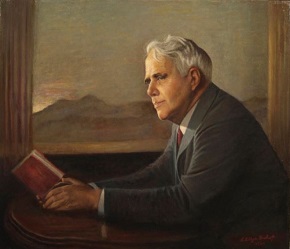
Robert Frost (26 maart 1874 – 29 januari 1963)
Portret door A. Allyn Bishop, 1936
De Duitse schrijver Patrick Süskind werd geboren in Ambach op 26 maart 1949. Zie ook alle tags voor Patrick Süskind op dit blog.
Uit: Die Taube
„Als ihm die Sache mit der Taube widerfuhr, die seine Existenz von einem Tag zum andern aus den Angeln hob, war Jonathan Noel schon über fünfzig Jahre alt, blickte auf eine wohl zwanzigjährige Zeitspanne von vollkommener Ereignislosigkeit zurück und hätte niemals mehr damit gerechnet, daß ihm überhaupt noch irgend etwas anderes Wesentliches würde widerfahren können als dereinst der Tod. Und das war ihm durchaus recht. Denn er mochte Ereignisse nicht, und er haßte geradezu jene, die das innere Gleichgewicht erschütterten und die äußere Lebensordnung durcheinanderbrachten.
Die meisten derartigen Ereignisse lagen Gott sei Dank weit zurück in der grauen Vorzeit seiner Kindheits- und Jugendjahre, und er erinnerte sich ihrer am liebsten überhaupt nicht mehr, und wenn, dann nur mit größtem Unbehagen: An einen Sommernachmittag in Charenton etwa, im Juli 1942, als er vom Angeln nach Hause kam – es hatte ein Gewitter gegeben an jenem Tag und dann geregnet, nach langer Hitze, auf dem Heimweg hatte er die Schuhe ausgezogen, war mit nackten Füßen auf dem [6] warmen, nassen Asphalt gegangen und durch die Pfützen gepatscht, ein unbeschreibliches Vergnügen… – er war also vom Angeln nach Hause gekommen und in die Küche gelaufen, in der Erwartung, die Mutter dort beim Kochen anzutreffen, und da war die Mutter nicht mehr vorhanden, nur noch ihre Schürze war vorhanden, sie hing über der Lehne des Stuhls. Die Mutter sei weg, sagte der Vater, sie habe für längere Zeit verreisen müssen. Man hat sie fortgeschafft, sagten die Nachbarn, man hat sie zuerst ins Vélodrome d’Hiver geschafft und dann hinaus ins Lager von Drancy, von dort geht’s nach Osten, da kommt keiner zurück. Und Jonathan begriff nichts von diesem Ereignis, das Ereignis hatte ihn vollkommen verwirrt, und ein paar Tage später war dann auch der Vater verschwunden, und Jonathan und seine kleinere Schwester befanden sich plötzlich in einem Zug, der nach Süden fuhr, und wurden nächtens von wildfremden Männern über eine Wiese geführt und durch ein Waldstück gezerrt und abermals in einen Zug gesetzt, der nach Süden fuhr, weit, unbegreiflich weit, und ein Onkel, den sie bisher noch nie gesehen hatten, holte sie ab in Cavaillon und brachte sie auf seinen Bauernhof nahe der Ortschaft Puget im Tal der Durance und hielt sie dort versteckt bis zum Ende des Krieges. Dann ließ er sie auf den Gemüsefeldern arbeiten.”
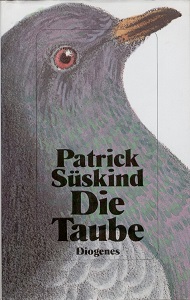
Patrick Süskind (Ambach, 26 maart 1949)
Cover
De Engelse dichter Alfred Edward Housman werd geboren op 26 maart 1859 in Fockbury, Worcestershire. Zie ook alle tags voor A. E. Housman op dit blog.
On Wenlock Edge the wood's in trouble;
On Wenlock Edge the wood's in trouble;
His forest fleece the Wrekin heaves;
The gale, it plies the saplings double,
And thick on Severn snow the leaves.
'Twould blow like this through holt and hanger
When Uricon the city stood:
'Tis the old wind in the old anger,
But then it threshed another wood.
Then, 'twas before my time, the Roman
At yonder heaving hill would stare:
The blood that warms an English yeoman,
The thoughts that hurt him, they were there.
There, like the wind through woods in riot,
Through him the gale of life blew high;
The tree of man was never quiet:
Then 'twas the Roman, now 'tis I.
The gale, it plies the saplings double,
It blows so hard, 'twill soon be gone:
To-day the Roman and his trouble
Are ashes under Uricon.

A. E. Housman (26 maart 1859 – 30 april 1936)
Cover
De Italiaanse, Duitstalige, dichteres en schrijfster Bettina Galvagni werd geboren op 26 maart 1976 in Neumarkt. Zie ook alle tags voor Bettina Galvagni op dit blog.
Uit: Guinevere in Zürich
“Guinevere, Sie verlassen mich, bevor ich Sie verlasse. Sie flüchten vor mir.“ Ja, es ist wahr, ich hatte Rachel Zilberstein verlassen. Ich hatte Anfälle, ich wurde mit der Ambulanz ins Krankenhaus gebracht, die Psychiatrie ersetzte im Sommer das Schwimmbad und im Winter den Schnee, ich verbrachte ein paar Stunden dort, ein paar Tage, ein paar Wochen, dann Monate und schließlich drei Jahre. Irgendwann gelang es Madame David, eine in der Schweiz lebende Tante von mir ausfindig zu machen, zu der ich nie Kontakt hatte. Sie nahm mich auf, bei sich, ihrem Mann, einem Professor, der wissenschaftliche Bücher und Romane publizierte, und ihrer Tochter auf dem Zürichberg.
In der ersten Zeit gingen wir oft am See spazieren, im Park neben ihrem Haus, wir besuchten alle möglichen Professoren und Professorinnen, Kollegen des Onkels. Abends saß ich manchmal in seinem „Büro“. Die matt glänzenden weißen Bücherregale waren mit einem dünnen Messingstreifen verziert, der im Schein der grünen Schreibtischlampe geheimnisvoll aussah. Die Bücher befanden sich in einer perfekten Ordnung. Ich saß an dem englischen Schreibtisch, betrachtete die silbernen Köcher und die blauen und roten Caran-d’Ache-Kugelschreiber, mit denen mein Onkel zu schreiben pflegte. Auch sie waren perfekt arrangiert. Nie wagte ich es, mich auf die Le-Corbusier-Liege zu setzen, auf der mein Onkel seine Bücher las. Er hatte einmal zwei Dinge zu mir gesagt, erstens, daß er im Bett nicht lesen könne, und zweitens, daß kein einziges Buch in seinen Regalen stehe, das er nicht gelesen habe. Das hatte mich sehr beeindruckt. Ich las nahezu ausschließlich im Bett, erstens, weil es der einzige Ort war, an dem ich allein war (ich schlief im zweiten Zimmer meiner Cousine), und zweitens, weil ich seit meinen Anfällen grundsätzlich viel im Bett lag, wo ich stundenlang mein kleines eiskaltes Herz hörte, das schlug und schlug und schlug, so wie Hühner am Morgen ihr Futter aufpicken, pick pick pick, und dann begann ich an die Katze zu denken, die bei Madame David manchmal aufgetaucht war, sie war schwarz und hatte grüne Augen, und wir haben uns sehr geliebt. Ich betete, die Katze möge weiterleben, sie möge alles nicht so sehen, wie es ist, die kleine, kalte Wohnung, den harten Pariser Winter, dessen Inneres so voller heißer Versprechen ist wie das alte venezianische Haus voller Türen, von dem Joseph Brodsky erzählte, er öffnet alle die Türen, es wird immer orgiastischer, wie ein Maskenball... „
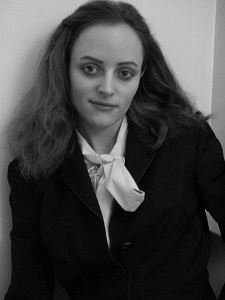
Bettina Galvagni (Neumarkt, 26 maart 1976)
De Amerikaanse dichteres en schrijfster Erica Jong werd geboren in New York op 26 maart 1942. Zie ook alle tags voor Erica Jong op dit blog.
Uit: Fear of Dying
“I used to love the power I had over men. Walking down the street, my mandolin-shaped ass swaying and swinging to their backward eyes. How strange that I only completely knew this power when it was gone -- or transferred to my daughter, all male eyes on her nubile twentyish body, promising babies. I missed this power. It seemed that the things that had come to replace it -- marriage, maternity, the wisdom of the mature woman (ugh, I hate that phrase) -- weren't worth the candle. Ah, the candle! Standing up. Burning for me. Full of sound and fury signifying everything. I know I should fade away like a good old girl and spare my daughter the embarrassments of my passions, but I can't any more than I can conveniently die. Life is passion. But now I know what passion costs, so it's hard to be quite so carefree anymore.
But was I ever carefree? Was anyone? Wasn't love always an exploding cigar? Didn't Gypsy Rose Lee say, "God is love, but get it in writing"? And didn't Fanny Brice say, "Love is like a card trick -- once you know how it works, it's no fun anymore"? Those old broads knew a thing or two. And did they give up? Never!
I'm not going to tell you - yet -- how old I am or how many times I've been married. (I have decided never to get any older than fifty.) My husband and I read the obituaries together more often than we have sex. I'm only going to say that when all the troubles of my family of origin engulfed me and I realized that my marriage could not save me, I reached a point where I was just unhinged enough to put the following ad on Zipless.com, a sex site on the Internet:
Happily married woman with extra erotic energy seeks happily married man to share same. Come celebrate Eros one after noon per week. Discretion guaranteed by playful, pretty, imaginative, witty woman. Send e- mail and recent picture. New York area.
Talk about a woman on the verge of a nervous breakdown! It was autumn in New York -- season of mellow mists, Jewish holidays, and five-thousand-dollar-a-plate benefits for chic diseases."

Erica Jong (New York, 26 maart 1942)
Zie voor nog meer schrijvers van de 26e maart ook mijn blog van 26 maart 2017 deel 2.
Zie voor bovenstaande schrijvers ook mijn blog van 26 maart 2007 en ook mijn blog van 26 maart 2008 en eveneens mijn blog van 26 maart 2009.
|



